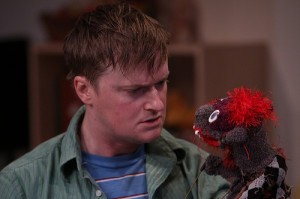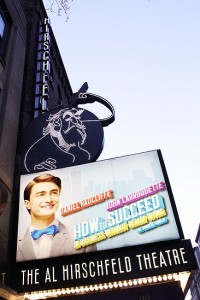In today’s Wall Street Journal drama column I devote extra space to three newly opened Broadway transfers, Hand to God, Wolf Hall, and Gigi. Here’s an excerpt.
* * *
 Nothing is more exciting than a new play that takes you by surprise, and Robert Askins’ “Hand to God,” which has moved uptown after two successful off-Broadway runs, does so over and over again. It is, at first blush, a raucously foul-mouthed little farce about Jason (Steven Boyer), a timid, sexually inhibited teenage puppeteer from Texas whose sock puppet, an unassuming-looking beastie named Tyrone, appears to be possessed by the Great Anarch Himself. But scratch the surface and you’ll find a dead-serious black comedy in which the disruptive power of lust is dramatized in a manner so outrageous as to recall the ruthlessly funny plays of Joe Orton.
Nothing is more exciting than a new play that takes you by surprise, and Robert Askins’ “Hand to God,” which has moved uptown after two successful off-Broadway runs, does so over and over again. It is, at first blush, a raucously foul-mouthed little farce about Jason (Steven Boyer), a timid, sexually inhibited teenage puppeteer from Texas whose sock puppet, an unassuming-looking beastie named Tyrone, appears to be possessed by the Great Anarch Himself. But scratch the surface and you’ll find a dead-serious black comedy in which the disruptive power of lust is dramatized in a manner so outrageous as to recall the ruthlessly funny plays of Joe Orton.
Margery, Jason’s unhappy mother (played by Geneva Carr, who should be much better known than she is), runs a Christian puppet ministry for small-town high-schoolers whose members include the seemingly mousy Jessica (Sarah Stiles) and Timothy (Michael Oberholtzer), a black-clad juvenile delinquent who longs to get into Margery’s panties. The same ambition is shared by the oleaginous Pastor Greg (Marc Kudisch), whose hypocrisy unhinges Jason. Suddenly Tyrone starts talking dirty—really, really, really dirty—and all hell, as they say, breaks loose.
The 34-year-old Mr. Askins, who was raised as an evangelical Christian, knows well the milieu of which he writes, slashing at it with a fine satirical frenzy. But except for one too-easy Chick-fil-A joke, there is no cheap condescension to be found in his caricature of faith in Red America…
If Mr. Boyer doesn’t win a Tony Award, there is no God. His two-headed performance is so beautifully exact and specific that it’s almost possible to forget that he is supported by an ideal ensemble cast…
Hilary Mantel has achieved total multi-platform ubiquity. Not only have her best-selling historical novels about intrigue in the court of Henry VIII been turned into a BBC mini-series that is currently showing on PBS’ “Masterpiece Theatre,” but Mike Poulton has also adapted them for the stage in a two-part Royal Shakespeare Company extravaganza called “Wolf Hall” that has just transferred to Broadway. All we need now is “The Six Zombies of Henry VIII.”
Ms. Mantel and her theatrical collaborator are working the same turf as Robert Bolt, who first put the tale of King Henry and Thomas More onstage a half-century ago in “A Man for All Seasons.” The difference is that Ms. Mantel, a militantly lapsed Roman Catholic who now declares that “the Catholic Church is not an institution for respectable people” (harrumph!), has given us a Protestant inversion of “A Man for All Seasons” in which Bolt’s deeply moral martyr-hero (played by Paul Scofield in “A Man for All Seasons” and in “Wolf Hall” by John Ramm) becomes a scourge-wielding, book-burning symbol of Catholic fanaticism….
 I haven’t read either of Ms. Mantel’s much-praised novels, nor am I a scholar of 16th-century England. I can, however, assure you that Mr. Poulton’s five-and-a-half-hour stage version of “Wolf Hall,” unlike Bolt’s immaculately crafted, endlessly quotable play, is competent but dullish…
I haven’t read either of Ms. Mantel’s much-praised novels, nor am I a scholar of 16th-century England. I can, however, assure you that Mr. Poulton’s five-and-a-half-hour stage version of “Wolf Hall,” unlike Bolt’s immaculately crafted, endlessly quotable play, is competent but dullish…
Whenever a new production of a familiar and well-loved work of art is billed as “re-imagined,” you’re almost always right to suspect dirty work at the creative crossroads. That’s what’s happened to “Gigi,” Heidi Thomas’ rewrite of the failed 1973 stage version of the 1958 Alan Jay Lerner-Frederick Loewe screen musical about a Parisian teenager whose family is training her to become a courtesan.
Just as Lerner and Loewe romanticized the tart 1944 novella by Colette on which Vincente Minnelli’s movie was based, so has Ms. Thomas, the creator of the soppy British TV series “Call the Midwife,” sanitized the show so as to render it more palatable to 21st-century sensibilities. For openers, Ms. Thomas has made Gigi older—she’s 15 in the novella, 18 onstage—while Gaston, the man-about-town who proposes to take her into his keeping, becomes a decade younger….
While I suppose that some such changes were inevitable, Ms. Thomas’ priggish “Gigi” is no less unfaithful in spirit to Colette’s novel, which is coolly realistic about the sexual realities that are its whole point. And whereas the film version of “Gigi” is full-hearted in its old-fashioned romanticism, the stage version, competently directed by Eric Schaeffer, flawlessly choreographed by Joshua Bergasse (“On the Town”) and featuring drop-dead-gorgeous sets by Derek McLane, is a high-gloss exercise in commodity theater that takes no chances and offers no thrills….
* * *
To read my review of Hand to God, go here.
To read my review of Wolf Hall, go here.
To read my review of Gigi, go here.
The trailer for the original off-Broadway production of Hand to God:

 It’s a byword in the theater world that you can make a killing on Broadway, but not a living. Time was, however, when major plays usually had a decent chance of succeeding there. The original 1947 production of “A Streetcar Named Desire,” for example, ran for two years—nothing to brag about next to “The Phantom of the Opera,” but spectacular by any other standard. And as late as 2007, Tracy Letts’ “August: Osage County,” a three-and-a-half-hour play acted by a cast of unknowns from Chicago, ran for a year and a half solely on the strength of its high quality. Once again, though, the conventional wisdom says those days are gone for good. Today’s playgoers, we’re told, prefer fluffier fare and will only pay top dollar to see movie and TV stars onstage.
It’s a byword in the theater world that you can make a killing on Broadway, but not a living. Time was, however, when major plays usually had a decent chance of succeeding there. The original 1947 production of “A Streetcar Named Desire,” for example, ran for two years—nothing to brag about next to “The Phantom of the Opera,” but spectacular by any other standard. And as late as 2007, Tracy Letts’ “August: Osage County,” a three-and-a-half-hour play acted by a cast of unknowns from Chicago, ran for a year and a half solely on the strength of its high quality. Once again, though, the conventional wisdom says those days are gone for good. Today’s playgoers, we’re told, prefer fluffier fare and will only pay top dollar to see movie and TV stars onstage.